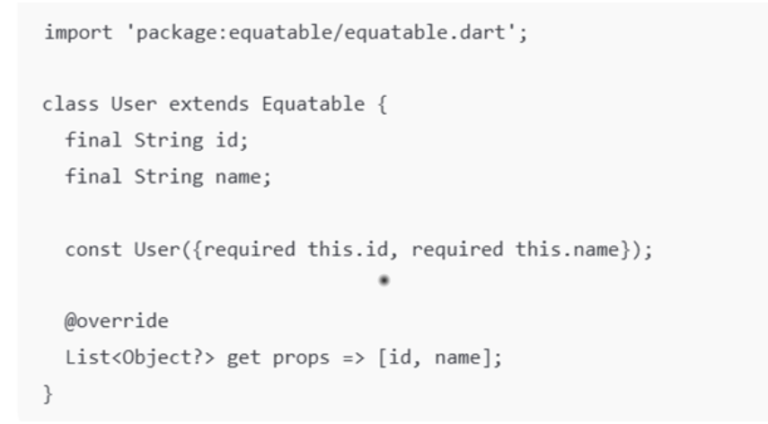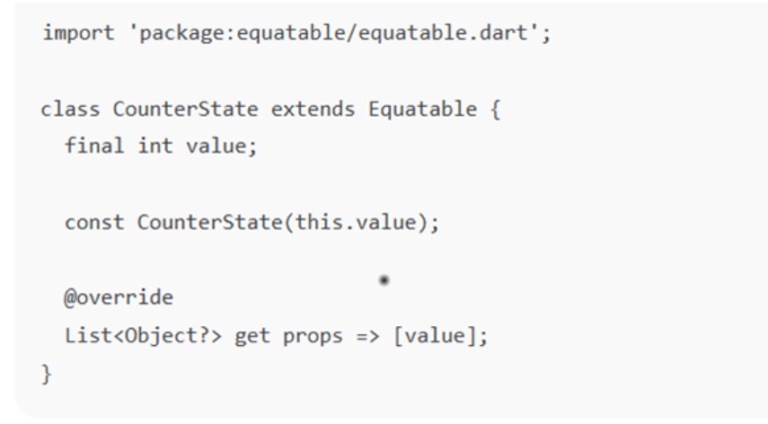Flutter Equatable: How to Simplify Equality Checks and Improve State Management?

When you begin to work with Flutter, one of the first things you realize is the frequency with which you create classes to store your app state and models, and events. As you move on with your project, you will find yourself comparing objects a lot. At that, you may understand that the default behaviour in Dart is not comparing objects by their values. Rather, it contrasts them by reference. This may cause unwanted results unless you are careful. For businesses working with a Flutter app development company, these details in equality checks often determine the efficiency of the application.
That is the point where the Equatable package comes in handy. Equatable can save you a lot of time and effort when handling state management, creating models, or writing tests. Many developers at top Flutter app development companies rely on this package to simplify repetitive logic while ensuring code consistency.
Why You Need Equatable?
When you make a Dart class, two instances of that class are not identical until they point to the same object in memory. To give an example, when you create two identical objects of User, Dart will still see them as two different objects. This becomes an issue in such a case as state management, where you would want to know whether the state changed. For enterprises that work with a custom Flutter app development company, this kind of optimization is particularly crucial to deliver scalable apps.
Fail to manage equality correctly, and your UI can rebuild when it should not, or fail to rebuild when it should. Manual equality checks are complex, and the larger a class has fields, the messier it is. This is why partnering with a reliable Flutter development company can save significant time when working on state management in Flutter.
Equatable does this by letting you specify equality in a clean and consistent manner.
How Equatable Works?
Using Equatable, all you have to do is extend your class to Equatable and override a simple getter called props. This informs Equatable which fields have to be taken into consideration when comparing equality. Many teams using Flutter app development services adopt Equatable to enforce uniformity in their architecture.
Here is a quick example:
Now, if you create two User objects with the same ID and name, they will be considered equal. You did not need to write any custom == operator or hash code logic.
This small step becomes a huge advantage when integrating top Flutter app development services into large-scale systems.
Using Equatable in State Management
If you are using packages like Bloc or Cubit, Equatable is especially useful. State classes in these patterns need to be compared often. Without Equatable, you would have to write custom logic to check equality, which can get repetitive and error-prone. Teams focusing on Flutter mobile app development services find this particularly helpful for real-time apps where performance matters.
Take this example of a simple counter state:
With this setup, Bloc can correctly identify when the state changes and rebuild the UI accordingly. You only rebuild when the value is actually different. Developers who hire Flutter developers for state-driven applications usually emphasize Equatable for better maintainability.
Writing Cleaner Tests
Equatable also makes your tests much simpler. When writing unit tests, you often need to compare objects to check if your code produces the expected results. This is especially valuable for startups that hire dedicated Flutter app developers to streamline test automation and ensure quality delivery.
Without Equatable, you might end up comparing each field manually in your tests. With Equatable, you can directly compare instances:
This makes your test code shorter, easier to read, and less prone to mistakes.
Benefits of Using Equatable
By now you can see that Equatable offers several benefits:
- Cleaner code – You avoid writing boilerplate equality logic.
- Fewer bugs – Equality checks are consistent and predictable.
- Better performance – Your UI rebuilds only when the state truly changes.
- Simpler tests – Object comparison is straightforward.
These advantages may seem small at first, but they add up as your project grows. This is one of the reasons why many companies hire Flutter app developers to integrate best practices like Equatable into their projects.
Common Mistakes to Avoid
While Equatable is simple to use, there are some mistakes you should watch out for.
- Forgetting to include a field in props: If you leave out a field, Equatable will ignore it during equality checks. This can cause your app to miss updates. Always double-check that all relevant fields are included. By consulting experts who offer Flutter consulting services, you can avoid such pitfalls and keep your app stable.
- Using mutable fields: Equatable works best with immutable classes. If your fields can change after object creation, equality comparisons can give unexpected results. Stick to final fields whenever possible.
- Extending Equatable without overriding props: If you extend Equatable but do not define props, equality will not work as intended.
By keeping these points in mind, you can avoid common pitfalls.
When Not to Use Equatable?
While Equatable is useful in many cases, it is not always needed. If your classes are simple and you never compare instances, then adding Equatable adds no real value. For example, a data holder that never gets compared might not require it.
Equatable shines in scenarios where equality matters. That includes state management, caching, and testing. If your use case falls outside these areas, you may not need it. Still, if you work with a Flutter app development company, they can guide you on when it is best applied for cross-platform development.
Getting Started
If you want to start using Equatable, you only need to add it as a dependency in your pubspec.yaml:
After running flutterpub get, you can extend Equatable in your classes and start defining equality with props. It is that simple.
Final Thoughts
As your Flutter projects become more complex, equality between objects becomes an important detail. If you rely on default Dart behaviour, you may run into bugs or extra rebuilds. Writing custom equality logic for each class is possible but quickly becomes repetitive.
Equatable solves this problem with a clean and simple approach. By extending your classes and defining props, you get consistent equality checks without clutter. This saves you time, keeps your codebase tidy, and makes your app logic more reliable.
If you want smoother state handling and simpler tests, Equatable is a tool worth adding to your toolkit. It keeps your focus on writing meaningful features rather than repetitive boilerplate, something every top Flutter app development company will emphasize for long-term success. Get in touch with AllianceTek to implement Flutter Equatable for your apps.
Lareal Young is a legal professional committed to making the law more accessible to the public. With deep knowledge of legislation and legal systems, she provides clear, insightful commentary on legal developments and public rights, helping individuals understand and navigate the complexities of everyday legal matters.
Recommended For You
Discover how predictive analytics is shaping the future of fleet management software through smarter maintenance, safer driving, and data-driven optimisation.
Simplifying Flutter App Architecture With Getlt in 2025 In 2025, when all things are fast and digital, each Flutter app
Hey, tech enthusiasts! Today, let’s dive into the world of Strategic IT Consulting and how Artificial Intelligence (AI) is revolutionizing
Browse by Category
- Travel
- Technology & Gadgets
- Sports & Games
- Software
- Shopping
- Reviews
- Real Estate
- Numerology
- News
- Make Money
- Lifestyle
- Law
- Home Improvement
- Health
- Gardening
- Games
- Finance
- Entertainment
- Education
- Digital Marketing
- Diet and Fitness
- Dating
- Construction
- Celebrity
- Career and Jobs
- Business
- blog
- Angel Number









